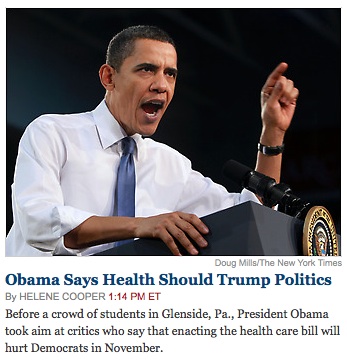Okay, so just now when I saw this…
 … I immediately thought of this:
… I immediately thought of this:
Tetlock, P. E. (1981). Pre- to postelection shifts in presidential rhetoric: Impression management or cognitive adjustment. Journal of Personality and Social Psychology, 41, 207-212.
Used content analysis to assess the conceptual or integrative complexity of pre- and post-election policy statements of 20th-century American presidents. Two hypotheses were tested. According to the impression management hypothesis, presidents present issues in deliberately simplistic ways during election campaigns but in more complex ways upon assuming office when they face the necessity of justifying sometimes unpopular decisions to skeptical constituencies. According to the cognitive adjustment hypothesis, presidents gradually become more complex in their thinking during their tenure in office as they become increasingly familiar with high-level policy issues. Results support only the impression management position. The complexity of presidential policy statements increased sharply immediately after inauguration but did not increase with length of time in office. Complexity of policy statements also significantly declined in reelection years.
I haven’t coded the transcript for integrative complexity yet. But when the reporter writes, “Mr. Obama has been seeking to narrow the complex arguments over health care policy,” it sounds a heck of a lot like what Tetlock was talking about.
Just came over here from Gelman’s blog.
And to add to this post: if Presidents don’t do this shift in complexity, it seems that they lose the re-election (see Thoemmes & Conway paper in Journal of Political Psych). So, I guess we could try to predict Obama’s re-election success by tracking his integrative complexity and see if it drops… (if it were only that simple)…
I’ll have to take a look @ that paper. I wonder if the political context affects the president’s approach or not. It seems to me like al lot of people who voted for Obama were, unfortunately, swayed by his charisma and not his message. I think it is this group who were easily moved against him by the Republicans’ simple, but effective strategy of reframing the debate in language that suits them (whether what they say is true or not) and hammering that message home with repetition and unity. In the face of such dogged opposition, it would seem clear to me (regardless of what data might say) that the only defense would be to adopt the opposition’s tactic – simplifiy the message and hit “start” on the mimeograph.
icomplexity, Brian: I generally take a functionalist approach to explanation of most things in psychology. If politicians are making this shift, I assume that they think it will get them some outcome they want (re-election). And yes, I’d guess that the further behind a president is, the more likely they are to use this strategy.
Sanjay,
that is an interesting comment about the likelihood of engaging in complexity drop being a function of how far behind you are. On the other hand, it seems difficult to measure how far behind a President is (opinion polls would be one option, but they often do not reflect actual voting behavior), and I guess it would be reasonable to expect inter-individual variabilty (some Presidents might not engage in this behavior for whatever reasons, regardless of how far behind they are).
Glad I checked out this blog – interesting stuff on here…